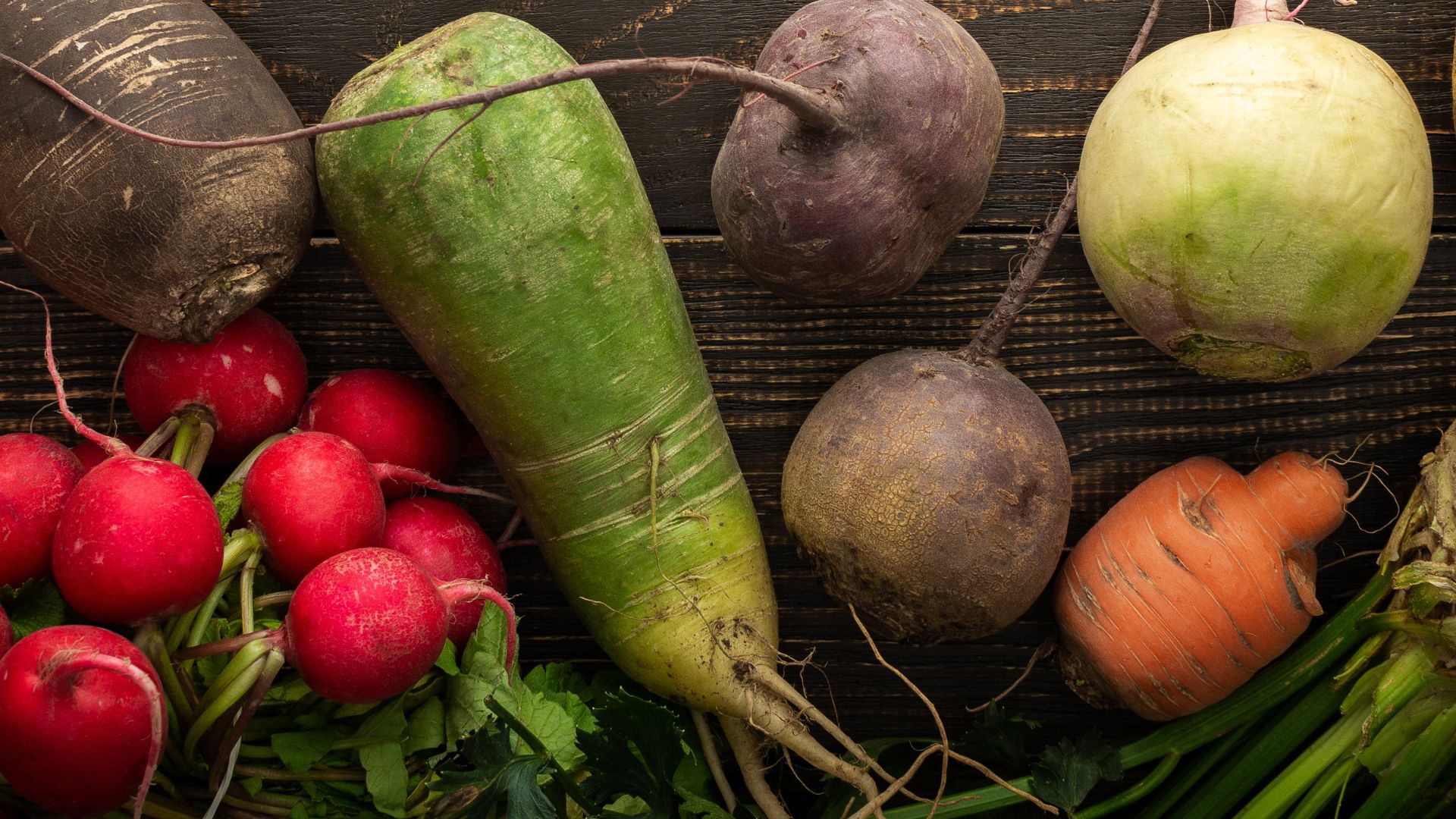
Root vegetables are an essential part of a healthy diet due to their high nutritional value, diverse health benefits, and versatility in cooking. Root vegetables grow underground and absorb a wealth of nutrients from the soil, which makes them dense in essential vitamins, minerals, and dietary fibers. Let's explore the key aspects and benefits of popular root vegetables:
Table of Contents
1. Nutritional Value of Root Vegetables
Root vegetables are generally low in calories and fats but rich in essential nutrients like:
- Dietary Fiber: Aids in digestion, helps maintain gut health, and can assist in controlling blood sugar levels.
- Vitamins: High in vitamins A, C, B6, and others that boost the immune system, promote skin health, and support overall bodily functions.
- Minerals: Packed with essential minerals like potassium, magnesium, iron, and calcium, contributing to heart health, bone strength, and muscle function.
- Antioxidants: Rich in antioxidants that help fight inflammation, reduce oxidative stress, and lower the risk of chronic diseases like cancer.
2. Health Benefits of Common Root Vegetables
Each root vegetable offers unique health benefits due to its distinct nutritional composition. Here are some of the most popular root vegetables:
a. Sweet Potatoes
- Rich in Beta-Carotene: High levels of beta-carotene, which converts to vitamin A, support eye health and skin health.
- Antioxidant Properties: Help in reducing oxidative stress and inflammation.
- Low Glycemic Index: Beneficial for stabilizing blood sugar levels, making them a good choice for diabetics.
b. Carrots
- High in Vitamin A: Excellent for improving vision, particularly night vision.
- Heart Health: Rich in dietary fiber and antioxidants that reduce cholesterol levels and support heart health.
- Skin and Immune Health: Vitamin C boosts immunity and helps keep skin healthy and glowing.
c. Beets
- Blood Pressure Regulation: Rich in nitrates that convert to nitric oxide, beets help lower blood pressure and improve blood flow.
- Detoxification: High in betalains, which support liver detoxification and reduce inflammation.
- Boost Exercise Performance: The nitrates in beets can enhance stamina and endurance in physical activities.
d. Turnips
- Rich in Fiber: Helps improve digestion and supports gut health.
- Bone Health: Contains calcium and magnesium, which are essential for maintaining bone density and preventing osteoporosis.
- Low-Calorie Option: Ideal for weight management as they are low in calories but filling.
e. Radishes
- Digestive Aid: High in fiber, radishes aid in digestion and detoxification of the liver and stomach.
- Rich in Vitamin C: Supports a strong immune system and skin health.
- Anti-Cancer Properties: Contain compounds like sulforaphane that may reduce the risk of certain cancers.
f. Potatoes
- Energy Provider: Rich in complex carbohydrates, which provide sustained energy.
- High in Potassium: Supports heart health by helping to regulate blood pressure.
- Source of Vitamin B6: Important for brain health and production of neurotransmitters like serotonin and dopamine.
g. Ginger
- Anti-Inflammatory: Known for its powerful anti-inflammatory properties, which can help reduce muscle soreness and arthritis symptoms.
- Digestive Health: Ginger aids in digestion, reduces nausea, and helps in alleviating indigestion and bloating.
- Boosts Immunity: Acts as a natural immune booster and has antiviral and antibacterial properties.
h. Garlic
- Cardiovascular Health: Known for lowering cholesterol levels, reducing blood pressure, and improving heart health.
- Antimicrobial Properties: Helps fight infections and boosts the immune system.
- Anti-Cancer Effects: Contains sulfur compounds that have been linked to a lower risk of several types of cancer.
3. Key Health Benefits of Root Vegetables
- Improved Digestion: Root vegetables are rich in dietary fiber, which supports digestive health by promoting regular bowel movements and preventing constipation.
- Boosted Immunity: The vitamins and antioxidants found in root vegetables help enhance the immune system and protect against infections and diseases.
- Weight Management: Due to their low calorie yet filling nature, root vegetables can help in maintaining a healthy weight by curbing overeating.
- Heart Health: The potassium, fiber, and antioxidants in root vegetables contribute to lowering blood pressure, reducing cholesterol, and promoting overall heart health.
- Stable Blood Sugar Levels: Some root vegetables, like sweet potatoes, have a low glycemic index, making them beneficial for those with diabetes by preventing blood sugar spikes.
- Anti-Inflammatory and Antioxidant Properties: Many root vegetables contain antioxidants that help reduce inflammation, lower the risk of chronic diseases, and fight oxidative stress in the body.
4. How to Incorporate Root Vegetables into Your Diet
- Roasting: One of the best ways to enhance the natural sweetness of root vegetables while retaining most of their nutrients.
- Boiling and Steaming: Helps preserve nutrients while keeping the vegetables soft and easy to digest.
- Stir-frying: A quick method to cook root vegetables while adding flavors from other vegetables, herbs, and spices.
- Soups and Stews: Root vegetables can be used in soups and stews for added texture, flavor, and nutrition.
- Salads: Raw root vegetables like carrots, radishes, and beets can be grated or thinly sliced and added to fresh salads.
Root vegetables are nutrient-dense powerhouses that provide a wide range of health benefits, from boosting immunity to supporting heart health and promoting digestive well-being. Including a variety of these vegetables in your daily meals can lead to a balanced diet, improved energy levels, and better overall health. With their versatility in cooking, root vegetables can be enjoyed in many delicious ways, making them a must-have in your diet.
Common Root Vegetables:
- Sweet Potatoes
- Carrots
- Beets
- Turnips
- Radishes
- Potatoes
- Ginger
- Garlic
Incorporating these root vegetables into your diet is an easy way to boost your nutritional intake and improve your overall well-being.




Leave a Reply
You must be logged in to post a comment.